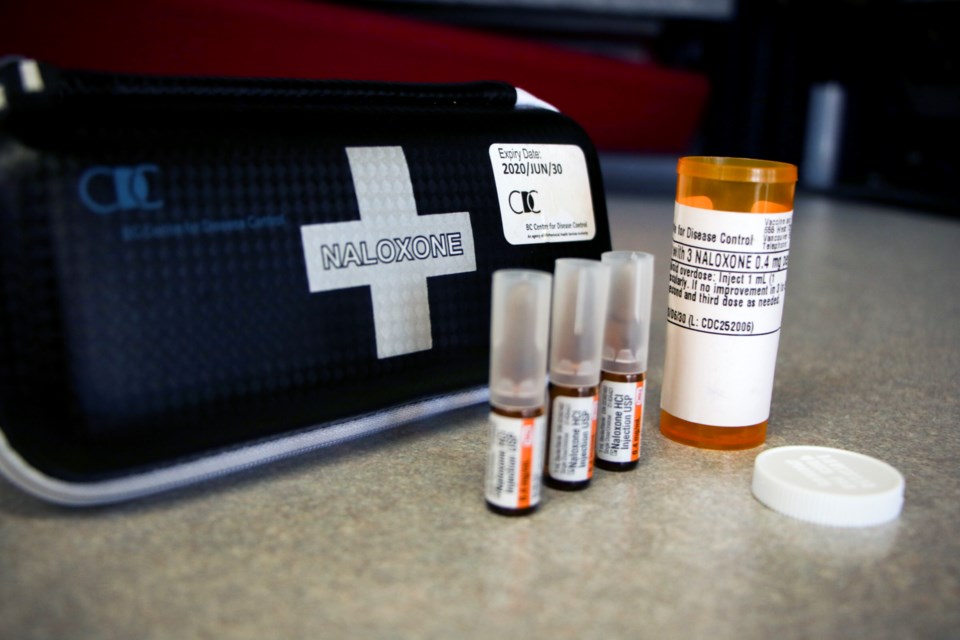New Westminster is among the deadliest cities in B.C. when it comes to illicit drug toxicity deaths thus far in 2021.
The BC Coroners Service has released a report showing that 333 lives were lost to suspected drug toxicity in August and September, bringing the total number of British Columbians lost this year to 1,534.
The Nov. 9 report showed that more people died of suspected illicit drug toxicity deaths in British Columbia in August and September than what’s ever been recorded in those months.
In New Westminster, 33 people died of toxic illicit drug deaths in the first nine months of 2021, said the report.
That compares to 35 deaths in 2020 and 20 deaths in 2019. This year’s total isn’t far behind the 2018, when a record of 37 people died in the drug-poisoning crisis in New West.
"Once again, we are reporting record numbers of deaths in our province due to the toxic illicit drug supply," chief coroner Lisa Lapointe said in a news release. "The tremendous loss being felt by families and communities across B.C. as they mourn loved ones lost far too soon is heartbreaking."
The report shows the highest number of deaths from Jan. 1 to Sept. 30 were in Vancouver (355), followed by Surrey (188), Victoria (103), Abbotsford (60), Burnaby (58), and Kelowna and Kamloops (each with 50). Chilliwack recorded 39 deaths during the first nine months and Prince George had 35, with Langley and New Westminster both recording 33 deaths.
According to the report, the 1,534 deaths in 2021 are the most in the first nine months of a calendar year and represent a 24% increase over the 1,240 deaths recorded between January and September 2020. The provincewide death rate stands at 39.4 per 100,000 residents, nearly double the rate in 2016 when the public health emergency into substance-related harms was first declared.
The report stated toxicology results indicate the illicit drug supply in B.C. is both volatile and increasingly toxic. Fentanyl and its analogues have now been detected in 84% of all illicit toxicity deaths in 2021, with carfentanil, a particularly potent analogue, being detected in 137 deaths, more than double the 65 deaths recorded in all of 2020.
The vast majority of toxicological results indicate the presence of multiple substances, with the three most frequently detected (in addition to fentanyl) being cocaine, methamphetamine/amphetamine and other opioids, stated the report.
"Our province is in the sixth year of this public health emergency, and the death rate due to toxic drugs has never been higher," Lapointe said. "Urgent action on a number of fronts is required, including much broader access to safe supply, more readily available and efficient drug-checking services, and a shift from a law-enforcement focus to a health-centred approach. The province's application to the federal government to decriminalize possession of illicit drugs for personal use is an essential step to address the drug toxicity crisis. Criminalizing those who use substances has done nothing to address this complex health issue and has resulted in greater suffering and marginalization. How many more deaths are we willing to accept to maintain drug policies and laws that have no basis in evidence?"
Local action
In March, New Westminster city council approved a motion asking the federal government to immediately develop a comprehensive, pan-Canadian overdose action plan. This would include consideration of reforms that other countries have used to significantly reduce drug-related fatalities and stigma, such as legal regulation of illicit drugs to ensure safe supply of pharmaceutical alternatives to toxic street drugs, as well as decriminalization for personal use.
In April, a health contact centre, which includes a safe consumption site, opened in downtown New Westminster. It provides a variety of services, including drug testing, harm reduction supplies, take-home naloxone kits, training on naloxone, education on safer drug use and referral to treatment centres and health services.
The health contact centre also includes safe witnessing services, so people can use drugs in a supervised setting to prevent overdose deaths.
In September, council directed city staff to participate on the Broken Drug Policies Inter-Municipal Strategic Action Committee, after being approached by the Canadian Drug Policy Coalition. The committee will be focusing on education and advocacy.
“For every drug toxicity death, there are many drug toxicity events (i.e., helping those who are at imminent risk of death due to drug toxicity) responded to by paramedics and first responders,” said a staff report. “According to Fraser Health, there were 814 drug toxicity events responded to by BC Emergency Heath Services (ambulances) in Fraser Health in June 2021, a record monthly high. Of these drug toxicity events, 45 of them were in New Westminster.”


